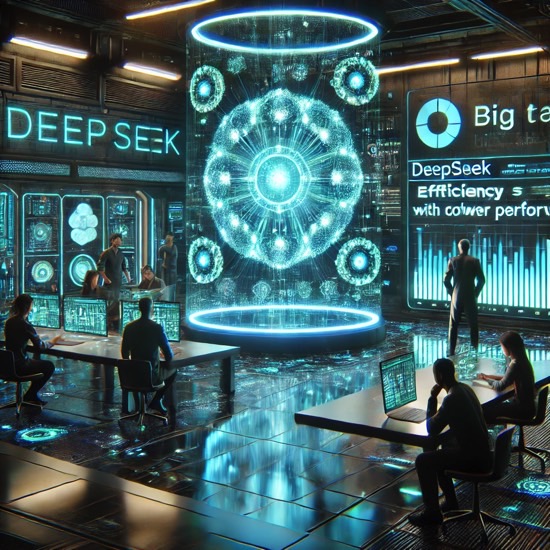How US Sanctions Sparked a More Efficient AI Model

TL;DR:
DeepSeek AI, developed under resource constraints, rivals Big Tech models trained with vastly larger budgets. This raises questions about the efficiency of AI training, the role of geopolitical limitations, and the impact of bias in AI systems. Could this lead to better, cheaper AI for the public?
Big Tech’s Wake-Up Call: Innovation Under Sanctions
I checked my phone this morning and nearly choked on my coffee—Nasdaq was down 500+ points. The tech market is getting rocked, but what caught my eye wasn’t just the dip; it was a low-budget AI model from a sanction-strapped team performing at the level of a $200/month service.
For context, Meta reportedly spent an estimated $90-130 million training LLaMA 3.1 (405B). Meanwhile, DeepSeek—a China-based AI project—achieved comparable performance with just $6 million in training costs. 🤯
This got me thinking:
- Does unlimited access to resources actually slow down innovation?
- Can limitations force better optimization in AI?
- Are we about to see AI models become cheaper, smarter, and more efficient because of necessity?
DeepSeek’s Secret Sauce: Doing More With Less
The DeepSeek team had no choice but to streamline their model training, cutting unnecessary computational overhead and maximizing efficiency. They weren’t starting from scratch either—AI research has been advancing for years, and they leveraged existing methodologies while optimizing them.
💡 Key takeaways from DeepSeek’s approach:
✅ Optimized training methods → Comparable performance at 1/10th the cost
✅ Better reasoning efficiency → AI is evolving beyond just scaling parameters
✅ Forced innovation under constraints → Less can actually be more
But hold on—DeepSeek isn’t fully open-source. The team has yet to release their training data, which means we don’t fully know what’s under the hood.
The Hidden Risks: Bias & Censorship in AI Models
Here’s where things get dicey. Transparency matters in AI—especially when geopolitical tensions shape what models can and cannot say. Reports indicate that DeepSeek's model censors topics like Tiananmen Square and criticisms of Xi Jinping.
🚨 Why does this matter?
- AI Bias is Real: Filtering or omitting certain data creates blind spots in models.
- Censorship Can Skew Knowledge: Suppressed information leads to misinformation and ignorance.
- Public Trust is at Stake: If AI models aren’t transparent, who decides what’s “truth” and what isn’t?
We’ve already seen how biased datasets can snowball into public disinformation. Whether intentional or not, this is a conversation we need to have.
Could This Lead to Cheaper, Smarter AI for Everyone?
Despite the concerns, there’s an unexpected silver lining—DeepSeek’s success under constraints might push Big Tech to rethink AI efficiency.
🔥 Imagine if…
- AI models could be trained at 1/10th the cost and still perform well
- AI services became more affordable for everyday users
- The “Tech Bros” stopped burning billions on bloated models and focused on better optimization
Sounds great, right? But let’s not get too optimistic just yet.
Final Thoughts: Where’s Our Money Going?
While I was deep in these thoughts, my notifications exploded. People want to know: What’s next? Where’s the market going? Will AI become more accessible, or will Big Tech double down on expensive models?
This unexpected shift in AI training is proof that necessity fuels invention. Maybe US sanctions inadvertently triggered a new era of AI efficiency. Or maybe DeepSeek is just a preview of what’s to come.
Either way, the game has changed. And the big players better start paying attention.
FAQ
1. What makes DeepSeek's AI model unique?
DeepSeek's model achieves comparable performance to industry leaders at a fraction of the cost, developed under resource constraints due to sanctions.
2. How might DeepSeek's success impact the AI industry?
It could push companies to focus on efficiency and cost-effectiveness in AI development, potentially leading to more affordable AI services.
3. What are the main concerns about DeepSeek's model?
Potential biases, censorship of certain topics, and geopolitical implications are the primary concerns raised by experts.
What’s Your Take?
Do you think AI companies will start prioritizing efficiency over brute-force scaling? Let me know! 🚀